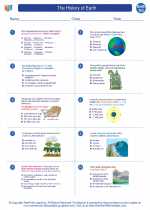The History of Earth -> boyle's law
Boyle's Law
Boyle's Law is a fundamental principle in physics that describes the relationship between the pressure and volume of a gas at constant temperature. The law states that the pressure of a given mass of gas is inversely proportional to its volume, when the temperature is kept constant. In simpler terms, if the volume of a gas decreases, the pressure of the gas increases, and vice versa.
The Formula
The mathematical expression of Boyle's Law is:
P1V1 = P2V2
Where:
Key Concepts
1. In a closed system at constant temperature, the product of pressure and volume is a constant.
2. As the volume of a gas decreases, the gas particles are more crowded, leading to an increase in pressure.
3. As the volume of a gas increases, the gas particles have more space to move, resulting in a decrease in pressure.
Study Guide
To understand and apply Boyle's Law, consider the following:
- Learn to use the formula P1V1 = P2V2 to solve problems involving changes in pressure and volume.
- Understand the concept of inverse proportionality and how it applies to the relationship between pressure and volume in Boyle's Law.
- Be familiar with the units of measurement for pressure (such as atmosphere, pascal, or psi) and volume (such as liters or cubic meters).
- Practice solving numerical problems that involve changes in pressure and volume of a gas while keeping the temperature constant.
By mastering Boyle's Law, you will have a strong foundation in understanding the behavior of gases and the principles of thermodynamics.
.◂Earth Science Worksheets and Study Guides High School. The History of Earth

 Worksheet/Answer key
Worksheet/Answer key
 Worksheet/Answer key
Worksheet/Answer key
